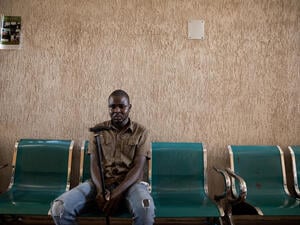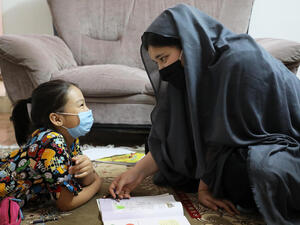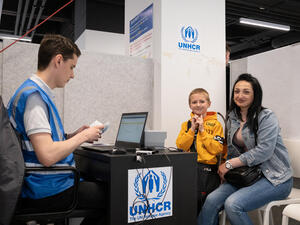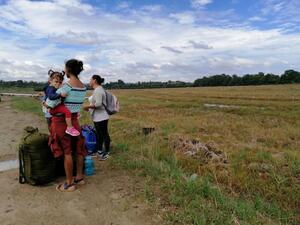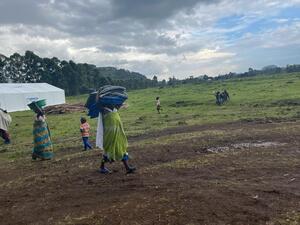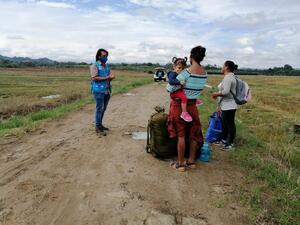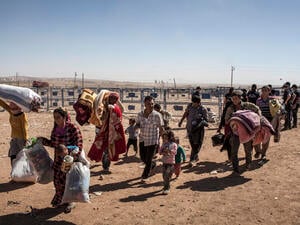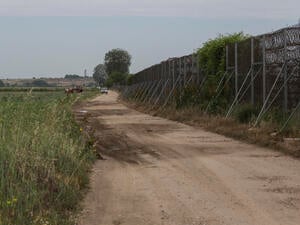Swiss discuss local implications of international asylum agenda
Swiss discuss local implications of international asylum agenda

Asylum seekers in Geneva listening to recordings explaining Swiss asylum procedures.
BERN, Switzerland, Oct 13 (UNHCR) - A lively two-day discussion, attended by around 200 delegates in the Swiss capital, ended Wednesday with a renewed sense of purpose about implementing an important international action plan on asylum, known as the Agenda for Protection, at the local Swiss level.
The symposium was jointly convened by UNHCR and the Organisation Suisse d'Aide aux Réfugiés (OSAR) in an effort to take stock of where Switzerland currently stands in relation to the goals set out in the Agenda for Protection, as well as to explore some practical approaches to achieving those goals. It was attended by representatives of the Swiss interior and foreign ministries, senior UNHCR officials, and a wide range of local and federal asylum officials, non-governmental organisation representatives, academics and refugees.
The landmark Agenda for Protection was agreed by states in 2002. It was the product of an international dialogue, known as the Global Consultations, that spanned four continents and lasted 18 months, culminating in a ministerial meeting - co-hosted by the Swiss government and UNHCR in Geneva in December 2001 - involving states that have acceded to the 1951 Refugee Convention.
The Bern Symposium included lively discussion about how to proceed in implementing the goals of the Agenda for Protection - which seeks to reinforce the international protection of refugees while at the same time finding solutions to a number of difficulties currently confronting states - in the face of a heated national political debate focused mainly on the introduction of ever more restrictive legislation (a phenomenon by no means only confined to Switzerland).
A number of speakers highlighted the challenges presented by the current political and public hostility, including Raymond Hall, Director of UNHCR's Europe Bureau, who was one of three keynote speakers on the first morning of the symposium.
Noting that the number of asylum seekers did not provide an adequate explanation for the rise in hostile public opinion - given that Europe is now back down to the levels it was receiving in the late 1980s - Hall said the reasons were complex:
"Above all," he said, "asylum and illegal immigration are much higher up the political agenda of European states, including Switzerland, than they used to be. These are issues which far-right parties, with xenophobic tendencies, have profited from, and on which elections and referenda can be won and lost."
He then cited a number of interlinked factors that were contributing to this dynamic, including first and foremost the public perception that governments have lost control of their borders to the profit of human smugglers and traffickers. With almost no viable legal way to enter Europe and claim asylum there, refugees have been forced to use the services of the smugglers alongside all those trying to get into Europe for economic reasons. As a result, refugees and asylum seekers have become associated in the public mind with a rise in criminality.
Hall also cited concerns about misuse of the asylum system by people who know they are not refugees, the costs of the system, and the difficulties some states are having removing failed asylum seekers back to their home countries as other factors contributing to a situation where asylum seekers are increasingly stigmatised and where the distinction between genuine asylum seekers (i.e. refugees) and illegal immigrants is more and more misunderstood and ignored.
Recent fears about cross-border security and terrorism have "reinforced the hostility towards foreigners and weakened public sympathy towards asylum seekers and the asylum system in general," said Hall.
The six goals of the Agenda for Protection - five of which formed the basis for workshops at the Bern Symposium - and the detailed plan of action that goes with them are, Hall said, "perfectly in tune with the difficult issues confronting European countries which, like Switzerland, are experiencing a crisis in the field of asylum."
The Bern Symposium is one of a number of similar meetings that have been arranged in various European countries as part of the crucial next phase, during which the goals of the Agenda for Protection start to be transformed into concrete measures designed to help states manage their asylum systems, while improving the status and everyday life of refugees.

